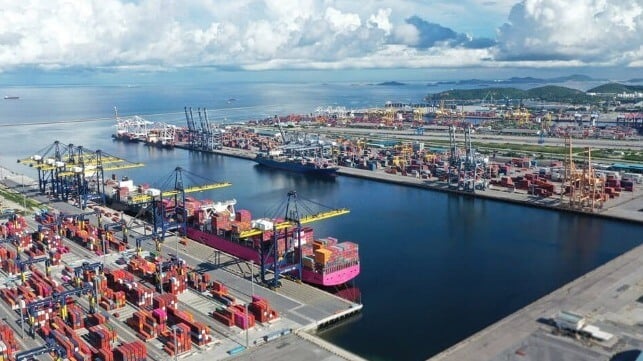China Gains Foothold in Thailand as Cosco Invests in Container Terminals

Cosco Shipping Ports, the terminal and port operating arm of the Chinese-government-owned shipping company, reports it is acquiring stakes in two of the terminal operations in Thailand’s leading port. It is a critical step for the company to expand its reach into Southeast Asia and support’s China effort to increase its influence in the region.
Laem Chabang Port is Thailand’s largest port accounting for approximately 80 percent of the country’s container throughput. Started in the early 1990s, it is located approximately 80 miles from Bangkok and close to the country’s major industrial and manufacturing hubs including Rayong.
Under the terms of the parallel agreements, Cosco will acquire 12.5 percent of Thai Laemchabang Terminal (TLT) and 30 percent of Hutchison Laemchabang Terminal (HLT) both in the port of Laem Chabang and controlled by Hutchison. The company has been operating TLT since 2002 and began driving expansion in the region with HLT which was started in 2006.
Expansion of the operations is ongoing adding additional berths and capacity. Cosco reports it will gain access to seven berths in the port. Once the current expansion is operational, the total annual capacity is expected to reach approximately 6.7 million TEU. Cosco is spending approximately $110 million for the stakes in the two terminals as well as a share in the Port of Sokhna at the northern end of the Red Sea in Egypt on the route to the Suez Canal.

that matters most
Get the latest maritime news delivered to your inbox daily.
Cosco cites the excellent connectivity of Laem Chabang Port to global trade routes saying that it makes it “an ideal gateway for international shipping.” China has long been seeking a foothold in Thailand to support its efforts to expand trade in Southeast Asia. Cosco points to Thailand’s Eastern Economic Corridor initiative which it says will further strengthen the long-term growth and prospects of Laem Chabang Port and the surrounding area.
Unlike other regions such as Germany where Cosco faced strong opposition to its purchase of a share of a terminal in Hamburg, the company is being welcomed into Thailand. The company cites a “stable and favorable regulatory environment,” in Thailand which it says minimizes its operating risks. Cosco said in its statement that the deal aligns with its long-term strategic intention to deepen Sino-Thai economic and trade cooperation and expand in the Southeast Asian market.
